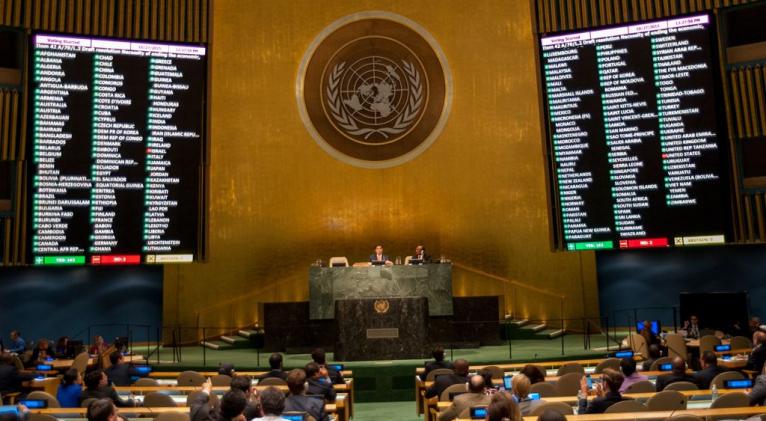Cuba: Yankees’s Hostility and Blockade are Still Ongoing
especiales

November 1st the UN General Assembly will put to vote once again the resolution "Necessity of putting an end to the economic, commercial and financial blockade imposed by the United States of America against Cuba."
Counting this one there’ll be 26th occasions in which the resolution is passed; last year added the support of 191 States out of the 193 that integrate the United Nations. Only the United States and its partner Israel voted against it. But the blockade is still unscathed, in an open challenge not only to the consent and international right, but to the opinion of the North American people and the Cuban residents in that country.
After the hope raised by Obama’s modest but important steps toward an improvement on the relationships with Cuba, a few months of Trump have been enough to gear into reverse and undermined what had been advanced. On June 16th, in a hostile speech, filled with coarse lies and stupidities that reminded the most aggressive times of the imperial politics toward Cuba, the U.S. president announced the change in a Miami theater packed of Cuban origin counter-revolutionaries. His administration set new obstacles to the almost nonexistent possibilities that North American entrepreneurs had to trade and invest in Cuba and additional restrictions to its citizens to travel to Cuba. Let’s not speak about the hilarious sonic ray with which their diplomats were attacked in Havana, which dozens of North American scientists of several fields have classified as nonexistent.
In March 2016 the North American Department of Treasure announced that it would authorize the use of the dollar by Cuba in its international business and to banks of that country to grant credits to Cuban importers of authorized North American products. A flat joke. Even at present neither thing has been able to come true.
The blockade worsening is intact in the financial and extraterritorial way, what causes deep damages to Cuba’s economy and brutally blocks the people’s right to development. That also implies another flagrant violation of the international right, by applying North American laws to third-parties, expressed in fines to foreign companies having business with Cuba, the denial of banks and international financial institutions to carry out operations with Cuba for fear of being fined, as well as the persecution of Cuban international financial transactions.
A few examples on how operates the extraterritorial application of the blockade: on June 20th, 2016 the Dutch mail company TNT returned to the Cuban consulate in Madrid two postal shippings bound to the embassies of Cuba in China and Indonesia. On August 1st, 2016 the same company canceled the postal service to the Cuban consulate in Rotterdam, Holland. The firm alleged that the refund was due to the U.S. blockade against Cuba. The suspension of these services creates serious inconveniences in the delivery of documents to overseas Cuban residents.
The fines issued by the banks are several. On January 13th, 2017 Washington fined the Canadian Toronto-Dominion Bank with 516105 dollars. The office corresponding of the Department of Treasure alleged that 29 transactions related with Cuba of that institution went through the North American bank system between years 2007 and 2011.
In April 2017, a German supplier refused to give Medicuba S.A. a device used in the diagnosis of prostate cancer. The supplier argued that the blockade prevented him from selling it. There are many more cases.
The blockade causes a lot of damage for every passing minute in every last aspect of the life of Cubans. In education, culture, sport, food science and, of course, in the economic development. Regardless the perfection with which Cuban economy is steered. Likewise there would be unbridgeable setbacks caused by the blockade of the most powerful and aggressive military power which largest market is the nearest to the Cuban.
Because of the blockade, Cuban patients lack irreplaceable drugs, only produced by North American laboratories. Cuban boys and girls don't have for that same reason access to drugs or oncology and cardiologic devices produced in the United States, the champion of human rights.
Amilkal Labañino Valdés / Cubasi Translation Staff













Add new comment